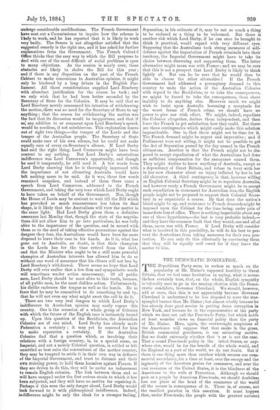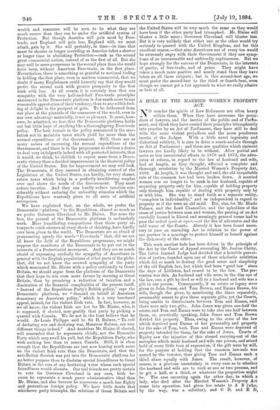THE DEMOCRATIC NOMINATION.
THE Republican Party seem to reckon so much on the popularity of Mr. Blaine's supposed hostility to Great Britain, that we feel some hesitation in saying, what is never- theless certainly true, that, on the whole, English sympathy is tolerably sure to go in the coming election with the Demo- cratic candidate, Governor Cleveland. We should, however, add at once, that this is not appreciably because Governor Cleveland is understood to be less disposed to wave the star- spangled banner than Mr. Blaine ; but almost wholly because he has already done good service in putting down corruption in New York, and because he is the representative of the party which we dare not call the Free-trade Party, but which holds at least sounder views on financial policy than the party of Mr. Blaine. Here, again, the overwrought suspicions of the Americans will suppose that that snake in the grass, British commercial greediness, is our animating motive. But we doubt extremely whether that 's or is not the case. That a sound Free-trade policy in the hinted States, or any- where else, would be for the benefit of the whole world, and for England as a part of the world, we do not doubt. But if there is one thing more than another which secures our com- mercial ascendancy, for a time at least, over the energy and the ingenuity of the American genius for commerce, and over the vast resources of the United States, it is the blindness of the Americans to the evils of Protection. Although we should gain as a people by American Free-trade, we should doubtless lose our place at the head of the commerce of the world all the sooner in consequence of it. There is, of course, not the smallest paradox in this assertion. It must happen that, under Free-trade, the people with the greatest national
wealth and resources will be seen to be what they are much sooner than they can be under the artificial system of Protection. But though America will gain most by Free- trade, and England will gain less, England will, we must admit, gain by it. She will probably, in time—in time that must be shorter or longer according as America takes a shorter or longer time in abolishing Protection—rank as the second great commercial nation, instead of as the first of all. But she may well be more prosperous in the second place than she would have been, without American Free-trade, in the first, place. Nevertheless, there is something so grateful to national feeling in holding the first place, even in matters commercial, that we doubt if many Englishmen could honestly say that they would prefer the second rank with greater prosperity to the first rank with less. At all events, it is certainly true that our sympathy with the very half-and-half Free-trade principles announced in the Democratic platform is due much more to our reasonable approbation of their tendency, than to any selfish feel- ing of delight in the prospect of gain. To be dethroned from our place at the pinnacle of the commerce of the world, even to our own advantage materially, is not so pleasant. It must, how- ever, be admitted, we fear, that the Democratic platform holds out but little hope of anything like a thoroughgoing Free-trade policy. The best feature in the policy announced is the reso- lution not to maintain taxes which yield far more than the normal expenditure of the Government. Still, there are so many means of increasing the normal expenditure of the Government, and there is in the programme so obvious a desire to deal very indulgently indeed with all protected interests, that it would, we think, be childish to expect more from a Demo- cratic victory than a decided improvement in the financial policy of the United States. But for improvement we may well look. The Democrats, if they succeed in obtaining control of the Legislature of the United States, can hardly, for very shame, retain taxes which bring in a perfectly bewildering surplus over and above the needs of the Government. They must reduce taxation. And they can hardly reduce taxation con- siderably without reducing the unhealthy stimulus which the Republicans have wantonly given to all sorts of artificial enterprises.
We have explained that, on the whole, we prefer the Democratic "platform " to the Republican, almost as much as we prefer Governor Cleveland to Mr. Blaine. But none the less, the perusal of the Democratic platform is melancholy work. More humiliating compositions than these party at- tempts to catch electors of every shade of thinking, have hardly ever been given to the world. The Democrats are so afraid of pronouncing openly the words " Free-trade " that, did we not all know the drift of the Republican programme, we might suppose the manifesto of the Democrats to be put out in the interests of a Protectionist movement. And they are so much afraid of expressing cordially the sympathy of Americans in general with the English populations of other parts of the globe, that, did we not know the avowed sympathy of the party which nominated Mr. Blaine with a policy unfriendly to Great Britain, we should argue from the platform of the Democrats that they hope to win even more favour by sneering at Great Britain, than by promising a reduction of taxation and a diminution of the financial complexities of the present tariff. " Instead of the Republican Party's British policy," says the Democratic platform, we " demand on behalf of American democracy an American policy," which is a very barefaced appeal, indeed, for the violent Irish vote. In fact, however, as we all know, the violent Irish are hot for Mr. Blaine, who, it is supposed, if elected, may gratify that party by picking a quarrel with Canada. We do not in the least believe that he would. As Louis Philippe said to Sir H. Bulwer, " To talk of declaring war and declaring war, Monsieur Bulwer, are very different things indeed." And doubtless Mr. Blaine, if elected, will remember that he represents chiefly, not the Dynamite Party which may swell his poll, but the Republican Party, who wish nothing less than to annex Canada. Still, it is clear enough that the Republicans are just now leaning much more on the violent Irish vote than the Democrats, and that the anti-British flourish was put into the Democratic platform for no better purpose than to disclaim special friendliness to Great Britain in the ears of any hesitating voter whom such special friendliness would alienate. Our real friends are pretty certain to vote for Governor Cleveland in any case, both be- cause he represents a much purer administrative ideal than Mr. Blaine, and also because he represents a much less flighty and pretentious foreign policy. We have little doubt that whichever party triumphs, the relations of Great Britain and
the United States will be very much the same as they would have been if the other party had triumphed. Mr. Blaine will bluster a little more ; Governor Cleveland will bluster less. But it is very unlikely that either one or the other would try seriously to quarrel with the United Kingdom, and for this excellent reason,—that nine Americans out of every ten would be extremely angry with their Government if they saw symp- toms of an unreasonable and unfriendly captiousness. But we hope strongly for the success of the Democrats, in the interests of purity, of free-trade, and of peace. They might have taken a much more positive and manly stand than they have taken on all these subjects ; but in this second-best age, we must prefer the second-best to the third or fourth-best, even though we cannot get a fair approach to what we really admire as best of all.



































 Previous page
Previous page